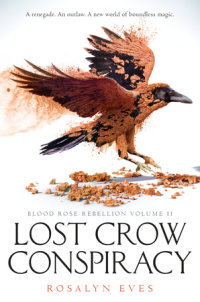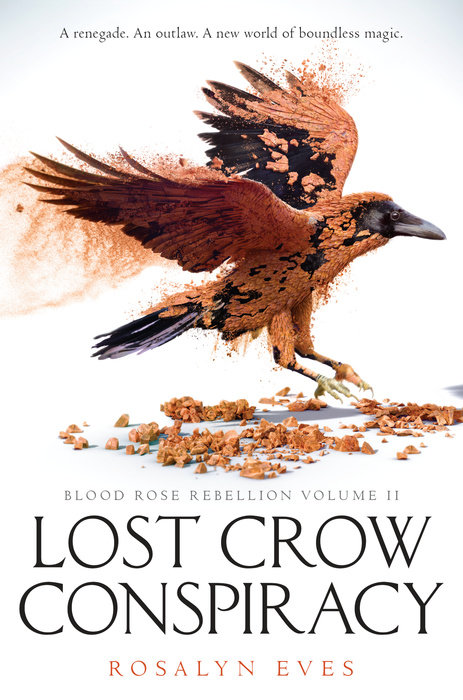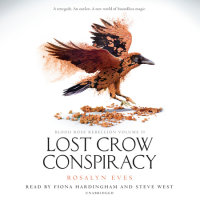Lost Crow Conspiracy (Blood Rose Rebellion, Book 2)
Lost Crow Conspiracy (Blood Rose Rebellion, Book 2) is a part of the Blood Rose Rebellion collection.
Lost Crow Conspiracy is the dark, dazzling, action-packed sequel to Anna Arden's explosive societal debut in YA fantasy trilogy Blood Rose Rebellion.
Sixteen-year old Anna Arden was once just the magically barren girl from an elite Luminate family. Now she has broken the Binding--and Praetheria, the creatures held captive by the spell, wreak havoc across Europe. Lower-class citizens have access to magic for the first time, while other Luminates lose theirs forever. Austria and Hungary are at odds once more.
Anna Arden did not know breaking the Binding would break the world.
Anna thought the Praetheria were on her side, content and grateful to be free from the Binding. She thought her cousin Matyas's blood sacrifice to the disarm the spell would bring peace, equality, justice. She thought her future looked like a society that would let her love a Romani boy, Gabor.
But with the Monarchy breathing down her neck and the Praetheria intimidating her at every turn, it seems the conspiracies have only just begun.
As threat of war sweeps the region, Anna quickly discovers she can't solve everything on her own. Now there's only one other person who might be able to save the country before war breaks out. The one person Anna was sure she'd never see again. A bandit. A fellow outlaw. A man known as the King of Crows. Matyas.
An Excerpt fromLost Crow Conspiracy (Blood Rose Rebellion, Book 2)
Chapter 1
Vienna, May 1848
There is a feeling a hunted creature gets: a prickling of fine hairs at the back of the neck, a sense of unseen eyes crawling across one’s spine, a shift in the air. A smell, perhaps.
I could not say what it was that night that struck me, only that between one turn on the ballroom floor and another, a sickness settled in my stomach. Someone--or something--was watching me.
My laugh turned brittle, my fingertips cold. I scanned the ballroom as I danced, searching for the source of my disquiet. Music swelled around me. Men in dark suits and women in jewel-toned gowns swirled past, gliding across the marble floor in time to one of Johann Strauss’s waltzes. Frost and fire flickered up alternating walls, part of the night’s illusions.
It was not so unusual, at a ball, to play at predator and prey: for women to hide behind their fans and fluttering lashes; for men to prowl the rim of the room in search of new game.
This was different.
Catherine would say I was being fanciful--or fretful. Maybe I was imagining things. Maybe the eyes I felt boring into me, the glances that shifted just before I turned, belonged to gentlemen whose interest in me was more flirtatious than feral. But most of those gentlemen owned their interest: their names crowded my dance card. And the thought of their attention did not make my skin crawl.
Perhaps it was one of the many military men, resplendent in their dress uniforms: white and red and green and gold. I had not missed how they turned away when I approached, how their mouths lined with distaste. The Austrians had not forgiven me for releasing Hungarian rebels in Buda-Pest in the middle of a battle their soldiers had lost. Only the Hungarian hussars, with their elaborately frogged and embroidered dolmans, smiled at my approach.
But neither the Austrian soldiers nor the Hungarian hussars knew the whole truth: that before I had freed the prisoners, I had broken the Binding spell, shattering elite control of magic and releasing the creatures held inside the spell. If they knew, they would do more than turn away. They would shun me entirely.
A particularly exquisite being floated past, as much light as solid form, bearing crystal goblets on a silver tray. I watched it pass, my gloved fingers curling. Of all the things I disliked about my new home in Vienna--from the overwhelmingly ornate buildings to the excessive formality--this new fashion of hiring inhuman beings distressed me most. I had not freed the creatures from the Binding for them to serve as ornaments for the nobility. Praetertheria, the scientists called them now. Praetheria for the nonscientists, for those who did not simply call them monsters.
“Do you make a long stay in Vienna?” my partner, a tall man with thinning hair, asked.
I wrenched my focus back. My inattention was rude, and he had done nothing--yet--to deserve it. “I am not certain. I am visiting my sister, Lady Gower, and her husband. He is attached to the British embassy here.” I did not tell him that it had taken a month of wheedling, after Catherine’s yuletide wedding, before Mama allowed me to leave England, and then only because Mama thought gentlemen on the Continent might not be so particular, and the money Grandmama had left me might sweeten the pill of my forward nature.
My chimera nature, the dual souls fighting for dominance inside me. But Mama knew nothing of that.
I shivered, wishing abruptly that I had not come. I did not want to dance with strangers, to make small talk with snobs. I wanted to be in Hungary, among my old friends, walking alongside the Duna River with Gábor. But this was part of the deal I had made with Mama when I left England: I could come to Vienna with Catherine if I made an effort in polite society.
My partner asked another question and I answered mechanically, my mental image of Gábor’s dark eyes and warm smile dissolving.
I searched out the creature again, now on the far side of the room. I wondered what it was: vila or hundra or álf or something I had no name for.
A girl with hair so pale it looked white stood beside the praetherian, whispering to it. As if she felt my eyes on her, she glanced up. A cold shock flashed through me. Was she the source of that hunted feeling? But her eyes fell away, uninterested.
We finished out our dance with idle chatter: discussions of the weather (chilly still), speculations as to whether Emperor Ferdinand and Archduke Franz Joseph might appear (I doubted it), and gossip (on my partner’s part) about people I did not know. Neither of us spoke about the real issue--the reason why so many outsiders had convened on Vienna in late spring, a season when the nobility should be preparing to leave for their country estates.
In the months since I had released the praetheria from the Binding, the question of what to do with them had grown increasingly vexing as they regained their strength and mingled more with society. What rights--if any--ought praetheria to have? Where should they live? A Congress to settle the issue was to begin in a little over a fortnight, on the seventh of June. Were it not for the Congress, Catherine and Richard might have stayed in England, and I with them.
My partner returned me to the corner where Catherine waited, her cheeks still flushed from her own turn on the floor. For a fraction of a second, some trick of the light and her profile made me see Grandmama, and I stopped, my heart aching anew with her loss.
Catherine turned at my approach. “Anna, can you not persuade Noémi to dance? I hate to see her buried among the dowagers and chaperones like this.”
My cousin Noémi shrugged, her fingers flickering upward to brush the glimmering pelican of her soul sign and then linger on the filigree cross she wore. Mátyás’s cross. “My brother is but eight months dead, ma’am. My uncle bid me come, but I do not wish to dance.” Her hands dropped to smooth the lavender folds of her skirt, and my heart fell with the gesture. Noémi would not have abandoned the black of deep mourning without pressure from her family. “I am no longer certain of my steps.”
Once, Noémi had loved a dance. As had I. The revolution and Mátyás’s death had changed us both. Luminate magicians had smoothed her blistered skin to show no scar, but some of the deeper damage she had sustained when we fought to break the Binding remained. Even Luminate healers could not work miracles. At home Noémi wore spectacles that sharpened some of her dulled vision but could not correct the near blindness in her right eye. But her aunt had forbidden the eyeglasses at the ball.
“You certainly do not lack for partners.” Noémi caught my wrist, where a silver charm dangled from a bracelet. It was cunningly engraved with the fire and ice of the night’s theme, the pages of my dance card folded neatly inside.
“Money compensates for many faults.”
Now it was Catherine’s turn to frown. “You underrate yourself.” Her own rose soul sign glittered, a reminder that she, like Noémi, was among the lucky Luminates who had not lost their magic when the Binding shattered and could still cast a soul sign for public display.
I had promised myself not to unduly aggravate Catherine, so I swallowed a tart answer and said merely, “Thank you.”
Catherine peered over my shoulder, reading the fine print of the names to Noémi. “Zichy, Széchenyi, Peterffy . . .”
“You are still the darling of the Hungarians, and not for any of your wealth,” Noémi said. “They remember what you did.”
“What we did.” Noémi had been with me the night I broke the Binding, and in the prison, during the terrible aftermath of fighting. I did not think either of us had forgotten the smell of gun smoke and blood, the keening of creatures in the street, the silence of an assassin moving through a dark prison. Besides Grandmama and Mátyás, who could no longer speak my secret, only four living souls knew what happened that night: Noémi, my uncle Pál, myself--and the praetherian with whom I had made my bargain, an army in exchange for a broken spell.
Catherine shuddered. “Please, Noémi, must you mention that now? Someone might hear you.”
As if talk of a revolution were the worst thing that could happen to one. I sprang up. “I am parched after all that dancing.”
“Richard has already gone to fetch me some lemonade. I’m sure he will bring some for you as well,” Catherine said. “And haven’t you a partner for this dance?”
“Please make my excuses.” I did not wait for Catherine’s answer before plunging into the crowd. Unwanted images from that bloody October day tumbled through my head. Though I pressed my fingers to my temples, I could not shake the pictures. I could not stay beside Catherine and pretend I had any interest in the dance. I could not sit placidly with Mátyás’s sister and lie to her with my smiles and light words.
Noémi did not know all my secrets. She did not know that everything we had won that day--the broken Binding, the praetherian army, the revolution--had been bought with her brother’s blood.
And I had held the knife that killed him.


